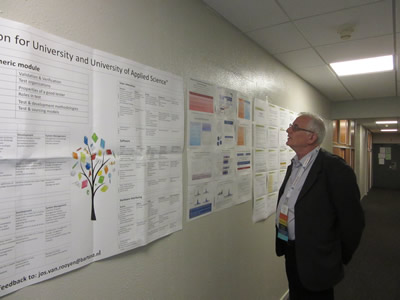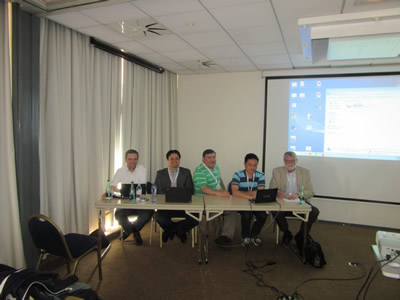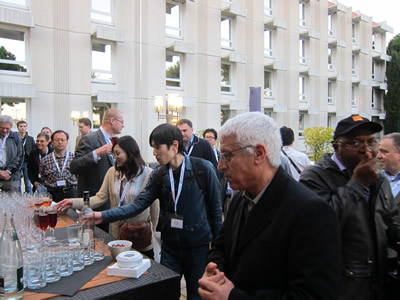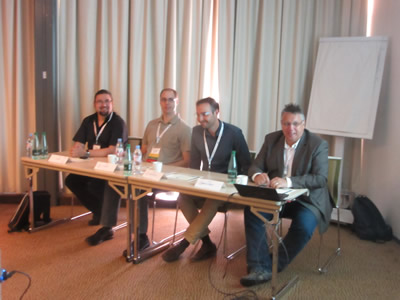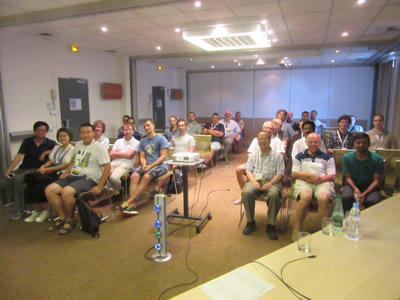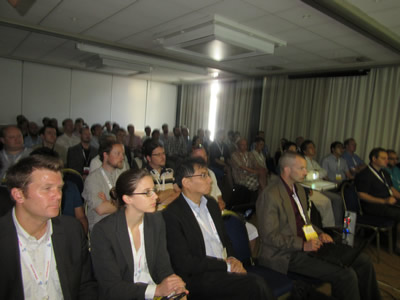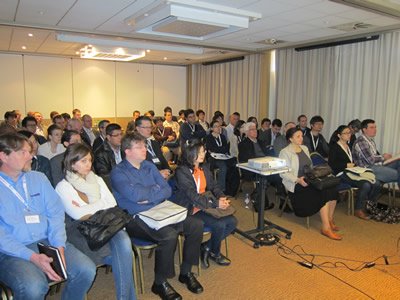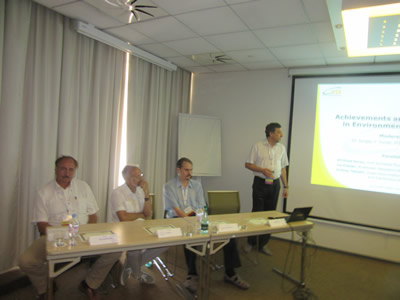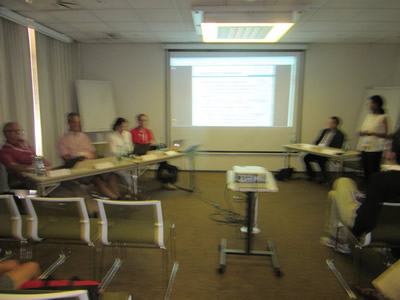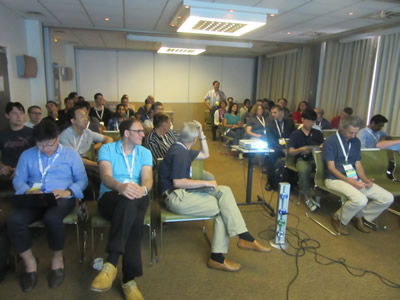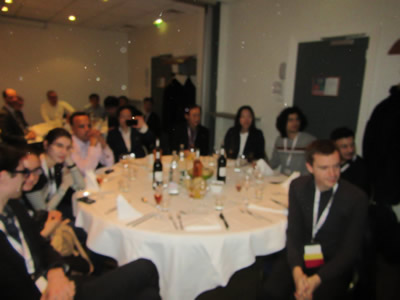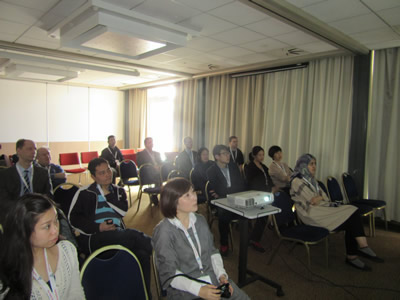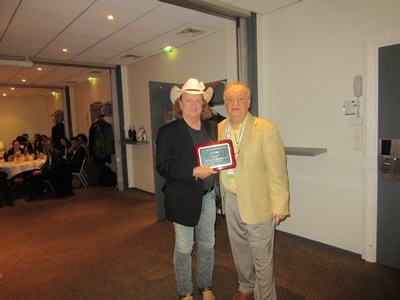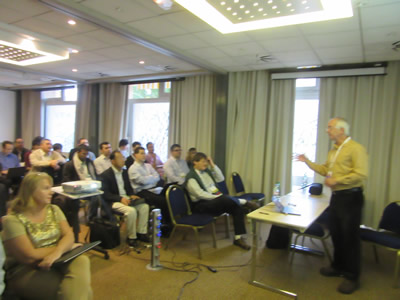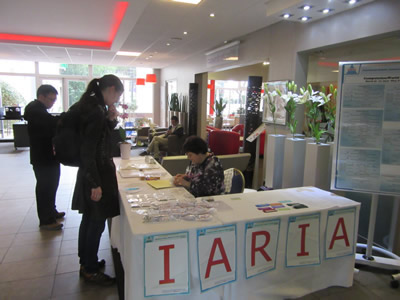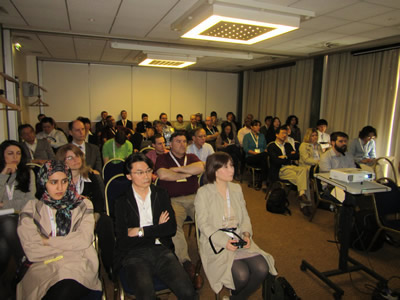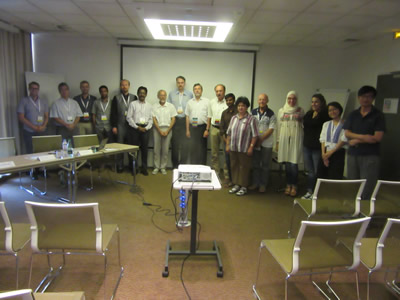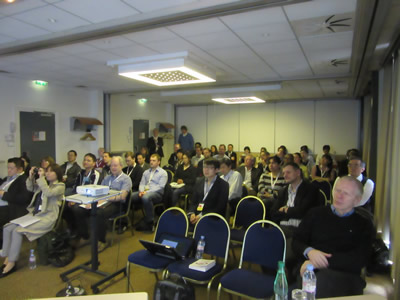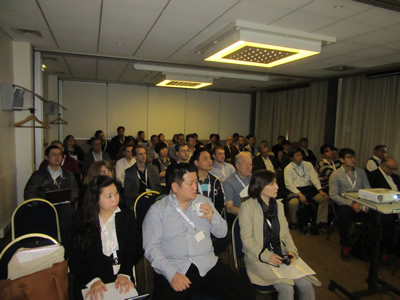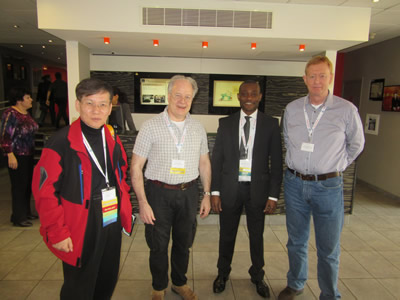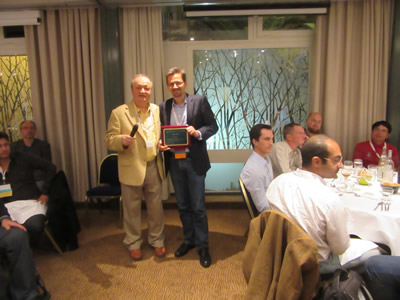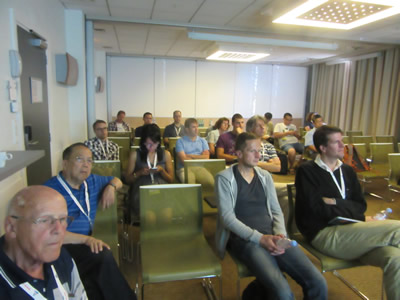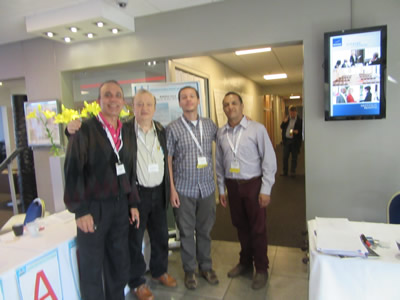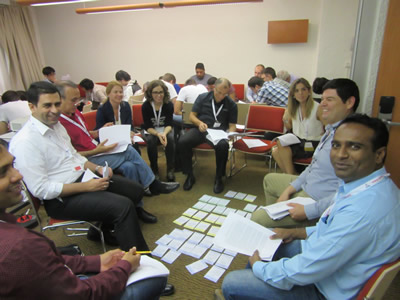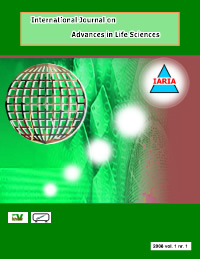PANDEMICS ANALYTICS 2022 - International Conference on Pandemics Analytics
July 24, 2022 - July 28, 2022
PANDEMICS ANALYTICS 2022: Call for Papers
Onsite and Online Options: In order to accommodate a large number of situations, we are offering the option for either physical presence or virtual participation (pdf slides or pre-recorded videos).
A pandemic is defined as a widespread occurrence of a disease, at a global level, and affecting a large number of people. Pandemics are rare, but their effects are deeply damaging to society. Continuous actions on prevention and control of infectious diseases exist, coordinated by national and international bodies, such as the World Health Organization (WHO). In pre-pandemic times, citizen preparedness has mainly focused on the early warning and early monitoring of infectious diseases. Local/global health research uses data gathering and visualization, usually via dashboards. Research cooperation between countries is generally on an 'as needed' basis.
The current COVID-19 pandemic triggered a series of models, intensive use of dynamic data and almost real-time local/global decisions. Strong measures were adopted by nations to curb the spread of the disease (lockdowns, social distancing, mandatory protective measures, vaccinations) following the spread waves and real-time metrics reports on the number of infections and deaths. The pandemic prompted a large cooperation between governments and researchers to share data and know-how, as well as national resources such as hospital beds, medical personnel, medical supplies, etc.
Limiting the impact of pandemics on citizens' lives (including social, economic, and educational aspects) requires the adoption of the best tools by all parties involved. These tools include Big Data for real-time accurate reports, AI-based decisions for supplies delivery scheduling, high speed and secure communications, as well as means for combating fake news on social networks and countering the offenders.
PANDEMICS ANALITICS 2022 starts a series of events targeting lessons learned from past and current pandemics and building a basis for pandemic science analytics. The focus is on models for preparedness, awareness, use of medical achievements (such as short-time vaccine development), promptly developed logistics (vaccine production, supply coordination, vaccinations, quarantines), as well as on handling hospital capacity and personnel.
We solicit both academic, research, and industrial contributions. We welcome technical papers presenting research and practical results, position papers addressing the pros and cons of specific proposals, such as those being discussed in the standard fora or in industry consortia, survey papers addressing the key problems and solutions on any of the above topics short papers on work in progress, and panel proposals.
Industrial presentations are not subject to the format and content constraints of regular submissions. We expect short and long presentations that express industrial position and status.
Tutorials on specific related topics and panels on challenging areas are encouraged.
The topics suggested by the conference can be discussed in term of concepts, state of the art, research, standards, implementations, running experiments, applications, and industrial case studies. Authors are invited to submit complete unpublished papers, which are not under review in any other conference or journal in the following, but not limited to, topic areas.
All topics and submission formats are open to both research and industry contributions.
PANDEMICS ANALYTICS 2022 conference themes:
Fundamentals models
From epidemic to pandemic situation theory; Empirical metrics on pandemic disruptions (social, medical, economic, educational); Models for ongoing pandemics (real-time); Predicting pandemic models; Models for pre-pandemic, early pandemic, and late pandemic; Tentative early estimation of causality; Prediction vs preparedness models; Explainability of pandemic models
Models and tools requirements
SIR (S- susceptible, I - infected and R - recovered); Susceptible–Infected–Recovered–Susceptible, Susceptible–Infected; Using Digital Twins approach for simulation; Meta heuristics-based propagation models; Percolation model (state of disorder to another more ordered state); Pandemic branching process with latency model [newly registered and latent cases]; Interactive interface/maps; Big data, Datasets, Artificial Intelligence, Machine learning, and Deep learning; Real-time data visualization; Cross-country visualization data; Cartography software and platforms; Interactive pandemic dashboards; AI-based tools for vaccine distribution and vaccination.
Solutions via coordinated pandemic Data/Datasets
Big Data-based technologies for prevention and control; Evaluation of data reliability and accuracy cross-countries; Obsolete models based on historical data (needs: reinforcement learning and distributed learning); Public and non-public federal spending data sets; Correlation of independent territories worldwide; Identify local and global data inconsistency; Access to consistent real-time health data infrastructure; Models with inconsistent, incomplete, and lagging data; Improvements on real data updates (collection, circulation, and security)
Solutions considering pandemic dynamics
Propagation pandemic models; Propagation forecast and analysis; Contamination frequency; Plateau patterns; Shape pandemic; Pandemic waves; Asymmetrical dynamics of epidemic propagation; Pandemic as chaos models; Individual contact graph
Selection of adequate pandemic metrics
Epidemic transmission parameters; Uncertainty and accuracy in prediction models; Outbreak data and reproduction; Motion, rate, disorder, speed… of particles; Range of reproduction numbers; Geolocation location and mobility data; Proximity tracing for pandemic control; AI-based real-time contact tracking
Models for pandemic severity estimation
Pandemic intensity; Herd immunity and effective reproduction (1--> N); Estimation of basic reproduction; Awareness diffusion in multiplex networks; Susceptibility and infectivity between aware and unaware individuals; Relax the degree of immunization
Preparedness models and required actions
Traveling and pandemic; Highway pandemic-oriented planning; Optimizing locations of medical institutions; Preparing logistics models; Urban models (local) and global preparedness; Types of generation mechanisms of individual awareness
Models for panic model propagation
Pandemic panic propagation model; Models of social response to pandemic; Urban models (local) and global models; Real-time optimization of panic prediction models; Conflicting governmental and agencies analytics
Sustainable IT environments for COVID-19 pandemic
Infrastructure for scalable gathering&processing data (Grid, Cloud, and Virtualized Computing); Scalable and interacting communication infrastructure; AI-driven pandemic preparedness logistics and explainability; Interactive tools for pandemic dynamics; Powerful visualization and online analytics tools; Personalized data interactive interfaces; Real-time data stream classes for virtual collaborations; Personal data protection
Lessons learned from COVID (+) (and counting)
Growth in research collaborations: boom and bust; Experience in short lifecycle vaccine production; Cross-nations logistics (knowhow, supplies, personnel, etc.); Experience online/physical presence classes (intensive use of Digital Connections); Universal observed pattern: re-balance the cooperation team with research teams; Needs for unified data collection standards; Acceleration of global logistics for drug discovery; Alerting: flexibility vs time; Real data-driven decisions; Roles of social network and social media
Lessons learned from COVID (-) (and counting)
Impact on geopolitical tensions; Red-flagged countries and their jurisdictions; Combating propaganda damaging the reliable information; Damage of scientific direct relations due to travel bans and infection/quarantine risks; Anxiety for socializing; aloofness; changes of humankind relationships; Damage the social-cognitive knowledge of the young students; Creation and increase of digital addiction; Roles of social network and social media; Need for digital detoxification; Issues with real-time data (Low efficiency of data collection, Difficulty in guaranteeing data quality, Low efficiency of data use, Lack of timely data sharing, Data privacy protection)
Deadlines:
Submission | May 22, 2022 |
Notification | Jun 15, 2022 |
Registration | Jun 22, 2022 |
Camera ready | Jun 25, 2022 |
Deadlines differ for special tracks. Please consult the conference home page for special tracks Call for Papers (if any).
INSTRUCTION FOR THE AUTHORS
Authors of selected papers will be invited to submit extended versions to one of the IARIA Journals.
Publisher: XPS (Xpert Publishing Services)
Archived: ThinkMindTM Digital Library (free access)
Prints available at Curran Associates, Inc.
How to submit to appropriate indexes.
Only .pdf or .doc files will be accepted for paper submission. All received submissions will be acknowledged via an automated system.
Contribution types
- regular papers [in the proceedings, digital library]
- short papers (work in progress) [in the proceedings, digital library]
- ideas: two pages [in the proceedings, digital library]
- extended abstracts: two pages [in the proceedings, digital library]
- posters: two pages [in the proceedings, digital library]
- posters: slide only [slide-deck posted on www.iaria.org]
- presentations: slide only [slide-deck posted on www.iaria.org]
- demos: two pages [posted on www.iaria.org]
FORMATS
Only .pdf or .doc files will be accepted for paper submission. All received submissions will be acknowledged via an automated system.
Final author manuscripts will be 8.5" x 11", not exceeding 6 pages; max 4 extra pages allowed at additional cost.
Helpful information for paper formatting for MS Word can be found here.
There is a community provided LaTeX template: the CTAN package iaria (with full IARIA formatting rules, including IARIA citation style, but for providing citation style it is tightly bound to pdflatex+biblatex+biber). In addition, there is also iaria-lite (not bound to pdflatex+biblatex+biber, but compatible with any TeX stack; thus, it cannot provide the IARIA citation formattings, but only the titlepage and content-related IARIA formatting rules). Based on the iaria package, there is a minimal working example as Overleaf template. When you are using the LaTeX templates, please still adhere to the additional editorial rules.
Slides-based contributions can use the corporate/university format and style.
Your paper should also comply with the additional editorial rules.
Once you receive the notification of contribution acceptance, you will be provided by the publisher an online author kit with all the steps an author needs to follow to submit the final version. The author kits URL will be included in the letter of acceptance.
We would recommend that you should not use too many extra pages, even if you can afford the extra fees. No more than 2 contributions per event are recommended, as each contribution must be separately registered and paid for. At least one author of each accepted paper must register to ensure that the paper will be included in the conference proceedings and in the digital library, or posted on the www.iaria.org (for slide-based contributions).
CONTRIBUTION TYPE
Regular Papers (up to 6-10 page article -6 pages covered the by regular registration; max 4 extra pages allowed at additional cost- ) (oral presentation)
These contributions could be academic or industrial research, survey, white, implementation-oriented, architecture-oriented, white papers, etc. They will be included in the proceedings, posted in the free-access ThinkMind digital library and sent for indexing. Please submit the contributions following the instructions for the regular submissions using the "Submit a Paper" button and selecting the appropriate contribution type. 12-14 presentation slides are suggested.
Short papers (work in progress) (up to 4 pages long) (oral presentation)
Work-in-progress contributions are welcome. These contributions represent partial achievements of longer-term projects. They could be academic or industrial research, survey, white, implementation-oriented, architecture-oriented, white papers, etc. Please submit the contributions following the instructions for the regular submissions using the "Submit a Paper" button and selecting the contribution type as work in progress. Contributors must follow the conference deadlines, describing early research and novel skeleton ideas in the areas of the conference topics. The work will be published in the conference proceedings, posted in the free-access ThinkMind digital library and sent for indexing. For more details, see the Work in Progress explanation page. 12-14 presentation slides are suggested.
Ideas contributions (2 pages long) (oral presentation)
This category is dedicated to new ideas in their very early stage. Idea contributions are expression of yet to be developed approaches, with pros/cons, not yet consolidated. Ideas contributions are intended for a debate and audience feedback. Please submit the contributions following the instructions for the regular submissions using the "Submit a Paper" button and selecting the contribution type as Idea. Contributors must follow the conference deadlines, describing early research and novel skeleton ideas in the areas of the conference topics. The work will be published in the conference proceedings, posted in the free-access ThinkMind digital library and sent for indexing. For more details, see the Ideas explanation page. 12-14 presentation slides are suggested.
Extended abstracts (2 pages long) (oral presentation)
Extended abstracts summarize a long potential publication with noticeable results. It is intended for sharing yet to be written, or further on intended for a journal publication. Please submit the contributions following the instructions for the regular submissions using the "Submit a Paper" button and selecting the contribution type as Extended abstract. Contributors must follow the conference deadlines, describing early research and novel skeleton ideas in the areas of the conference topics. The work will be published in the conference proceedings, posted in the free-access ThinkMind digital library and sent for indexing. 12-14 presentation slides are suggested.
Posters (paper-based, two pages long) (oral presentation)
Posters are intended for ongoing research projects, concrete realizations, or industrial applications/projects presentations. The poster may be presented during sessions reserved for posters, or mixed with presentation of articles of similar topic. A two-page paper summarizes a presentation intended to be a POSTER. This allows an author to summarize a series of results and expose them via a big number of figures, graphics and tables. Please submit the contributions following the instructions for the regular submissions using the "Submit a Paper" button and selecting the contribution type as Poster Two Pages. Contributors must follow the conference deadlines, describing early research and novel skeleton ideas in the areas of the conference topics. The work will be published in the conference proceedings, posted in the free-access ThinkMind digital library and sent for indexing. 8-10 presentation slides are suggested. Also a big Poster is suitable, used for live discussions with the attendees, in addition to the oral presentation.
Posters (slide-based, only) (oral presentation)
Posters are intended for ongoing research projects, concrete realizations, or industrial applications/projects presentations. The poster may be presented during sessions reserved for posters, or mixed with presentation of articles of similar topic. The slides must have comprehensive comments. This type of contribution only requires a 8-10 slide-deck. Please submit the contributions following the instructions for the regular submissions using the "Submit a Paper" button and selecting the contribution type as Poster (slide-only). The slide-deck will be posted, post-event, on www.iaria.org.
8-10 presentation slides are suggested. Also a big Poster is suitable, used for live discussions with the attendees, additionally to the oral presentation.
Presentations (slide-based, only) (oral presentation)
These contributions represent technical marketing/industrial/business/positioning presentations. This type of contribution only requires a 12-14 slide-deck. Please submit the contributions following the submission instructions by using the "Submit a Paper" button and selecting the contribution type as Presentation (slide-only). The slide-deck will be posted, post-event, on www.iaria.org.
12-14 presentation slides are suggested.
Demos (two pages) [posted on www.iaria.org]
Demos represent special contributions where a tool, an implementation of an application, or a freshly implemented system is presented in its alfa/beta version. It might also be intended for thsoe new application to gather the attendee opinion. A two-page summary for a demo is intended to be. It would be scheduled in special time spots, to ensure a maximum attendance from the participants. Please submit the contributions following the submission instructions by using the "Submit a Paper" button and selecting the contribution type as Demos. The Demos paper will be posted, post-event, on www.iaria.org.
Tutorial proposals
Tutorials provide overviews of current high interest topics. Proposals should be for 2-3 hour long. Proposals must contain the title, the summary of the content, and the biography of the presenter(s). The tutorial slide decks will be posted on the IARIA site.
Please send your proposals to tutorial proposal
Panel proposals
The organizers encourage scientists and industry leaders to organize dedicated panels dealing with controversial and challenging topics and paradigms. Panel moderators are asked to identify their guests and manage that their appropriate talk supports timely reach our deadlines. Moderators must specifically submit an official proposal, indicating their background, panelist names, their affiliation, the topic of the panel, as well as short biographies. The panel slide deck will be posted on the IARIA site.
Please send your proposals to panel proposal
